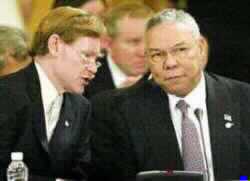The United States lobbied U.N. Security Council members to pass its draft resolution against Iraq on Thursday but Baghdad urged the world body to reject what it said was akin to a declaration of war. Russia and France, who hold vetoes in the council, believe the U.S. text that has been negotiated for weeks to disarm Iraq still has "triggers" for military action, and worked to obtain more concessions from Washington, diplomats said.
Impatient at weeks of inconclusive talks, the Bush administration introduced to the 15-member council on Wednesday a tough draft resolution, which Britain has said it will co-sponsor. It spells out how Iraq should account for its alleged weapons of mass destruction, with some U.S. officials expecting a vote as early as next week.
Iraq said the U.S. draft was like a declaration of war on both Baghdad and the United Nations.
"The United States wants to create justifications for attacking Iraq with a new resolution and this draft resolution presented by the United States, which it amended for the worse, is an insult to the United Nations and the international community," Iraqi Foreign Minister Naji Sabri told Qatar's al-Jazeera television.
Iraq has said U.N. inspectors -- who left in 1998 on the eve of a U.S.-British bombing raid -- can return but denies having nuclear, biological or chemical weapons.
But in a sign Baghdad is possibly preparing for an attack, Croatian officials said a ship the Balkan nation seized at sea this week was bound for Iraq from Yugoslavia carrying what appeared to be material used in the ignition of Scud missiles.
POWELL ON THE OFFENSIVE
Secretary of State Colin Powell lobbied Security Council member Singapore for support for the draft resolution.
"We are looking forward to your support," Powell told Lee Yock Suan, Singapore's second minister for foreign affairs, a senior U.S. official said. They met on the sidelines of an Asian economic meeting in Mexico.
Singapore is one of the 10 elected and non-permanent members of the U.N. Security Council, which also has five permanent members with veto power.
To be adopted, a Security Council resolution needs nine votes in favor and no veto from any of its five permanent members, the United States, Britain, France, Russia and China.
Powell took center stage as foreign and trade ministers from the 21-member Asia Pacific Economic Cooperation group met.
He held separate talks with the Russian Foreign Minister Igor Ivanov after earlier lobbying Mexico, which is also wavering on supporting the resolution of its neighbor and close ally.
Russia again on Thursday criticized the U.S. text and hoped council members would insist on major changes.
France also reiterated its misgivings over the draft, saying there was still much work to be done for a consensus to be reached at the United Nations.
"Progress has been made over the last few days ... but we still need a certain number of clarifications," Foreign Minister Dominique de Villepin told a news conference. "So there is still work to be done in New York."
China, which also holds a veto, reserved judgement on the new draft on Thursday, the day before Chinese President Jiang Zemin's meeting with Bush at his ranch in Texas. Bush is likely to seek China's acquiescence for possible military action.
While diplomats debated the resolution, anti-war groups said they were lobbying U.N. Security Council members, using e-mail chains and the Internet to flood them with calls and faxes urging them to oppose military action against Iraq.
"Diplomats will tell you they have been deluged with phone calls," Medea Benjamin of Global Exchange, a San Francisco-based human rights group, said.
PHOTO CAPTION
Secretary of State Colin Powell (R) and U.S. Trade Representative Robert Zoellick talk during a meeting between ministers in Los Cabos, Mexico, October 24, 2002. Powell lobbied Pacific Rim allies and trading partners to build support for the U.S. drive to topple Iraqi President Saddam Hussein's government and end North Korea's nuclear weapons program. (Andrew Winning/Reuters)
- Author:
& News Agencies - Section:
WORLD HEADLINES


 Home
Home Discover Islam
Discover Islam Quran Recitations
Quran Recitations Lectures
Lectures
 Fatwa
Fatwa Articles
Articles Fiqh
Fiqh E-Books
E-Books Boys & Girls
Boys & Girls  Women
Women










